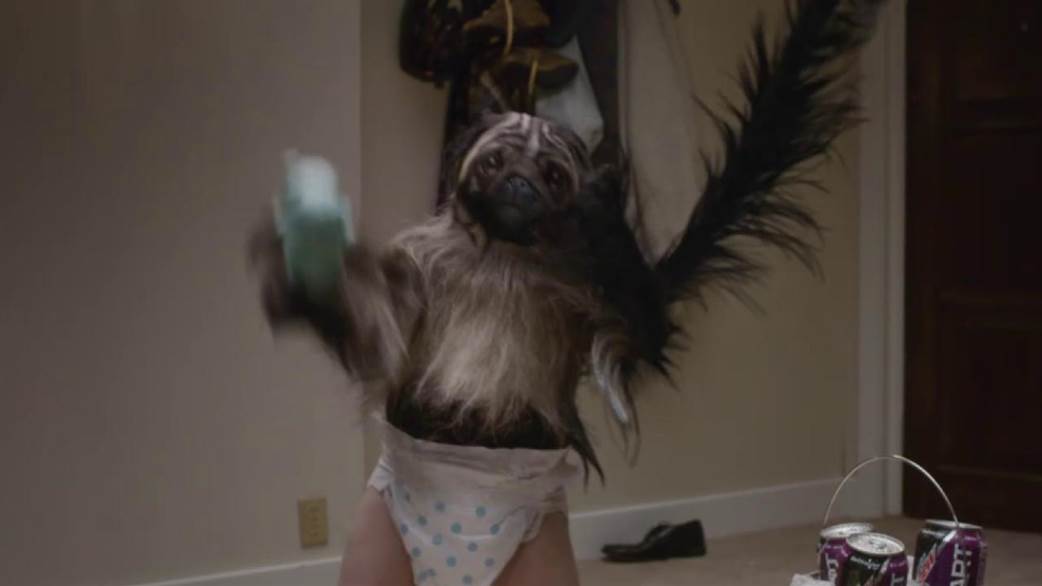‘Puppy Monkey Baby’ May Have Won Super Bowl 50
February 8, 2016
In a defensive war of attrition that saw both quarterbacks unable to move the ball down field, the real stars of Sunday’s third most watched broadcast of all time were the commercials. Instead of Cam Newton dabs, or Peyton Manning ducks, many will recall this Super Bowl because of memorable (sometimes controversial) spots like the Dorito’s sonogram, Jeff Goldblum channeling the Jeffersons, and of course, the incomparable horrors of Puppy Monkey Baby.
For the uninitiated (who may wish to avoid having this image indelibly burned in their brain), Puppy Monkey Baby is exactly what it sounds like; a Frankenstein monster of popular commercial tropes stitched together for one purpose. Puppy Monkey Baby’s goal? To sell you Mountain Dew Kickstart, and possibly to haunt your dreams forever.
If you can get past the visceral reaction of “what crime against nature just waltzed in to my living room”, Puppy Monkey Baby can actually be appreciated as a solid piece of marketing, maybe the best the big game had to offer this year.
Puppy Monkey Baby made a colossal impression on social media. Within minutes of the spot airing, parody accounts started popping up all over Twitter. Many just wanted to vent about how they could never un-see Mountain Dew’s new mascot, while others loved the spot for its unique, undeniably strange tone.
Whether the majority of viewers were taken aback by the Mountain Dew monstrosity or amused by the bizarre nature of the spot, one thing is certain. In a crowded field of contenders, Puppy Monkey Baby managed to maintain its trending status long after it originally aired. The millions spent on Puppy Monkey Baby garnered Mountain Dew over 68,000 mentions on social media the night of the Super Bowl, making it one of the most talked about brands of the evening.
While Puppy Monkey Baby was an effective ad on the merits of its shock value, it also deserves some consideration as one of this year’s smartest Super Bowl ads.
How many times have commercials featuring cute babies or silly animals been panned as low hanging fruit, lowest common denominator, or cheap laughs? After Blockbuster’s 1990 dancing baby ad the world has been subjected to countless commercials whose basic premise is “watch babies act/talk like adults and laugh”.
One needn’t go far to see how advertisers consistently leverage adorable animals to illicit strong emotions from the audience either. Just look at this year’s Heinz Super Bowl spot or any of Budweiser’s Clydesdale ads from the last decade.
Sunday night, Mountain Dew blended these well worn elements, babies and animals, into a singular entity; perhaps this synthesis was an advertising inevitability.
It was an interesting decision to have this combination of big ad tropes coalesce into something so visually unsettling and grotesque. Is Puppy Monkey Baby a monument to the sins of advertisers who’ve gone to the well of baby/animal humor one too many times? Perhaps.
Perhaps Puppy Monkey Baby is a cautionary symbol, the monstrous brain child of creatives willing to stitch together the most predictable constituent parts imaginable in the hopes of launching a viral sensation.
Importantly, Mountain Dew didn’t simply opt for Puppy Monkey Baby to dance around holding a can of Kickstart for 30 seconds. Instead, the creature hand delivers the sugary beverage to a cast of petrified human onlookers, who seem utterly shocked to have conjured this beast. These humans, transfixed by the mystique of Puppy Monkey Baby, are stand-ins for the audience at home. Mountain Dew sought to create a viral hit, and in the process created a kind of meta-commentary on what we, the viewing public, will be entertained by and fixate on—an ad that generated a remarkable amount of buzz by simply mashing together commercial clichés. It worked.
It remains to be seen whether or not Puppy Monkey Baby will successfully generate sales for Mountain Dew going forward. Nevertheless, for combining advertising stereotypes from Super Bowls past to create something fresh, mystifying, and self aware in its weirdness, Puppy Monkey Baby may have won Super Bowl 50.



